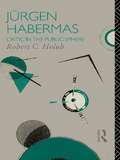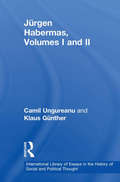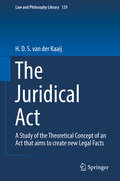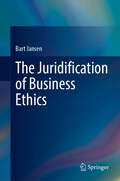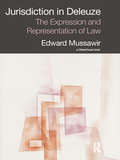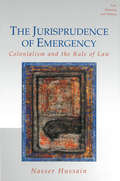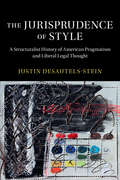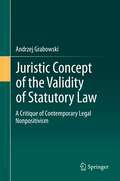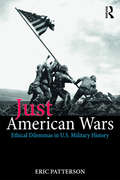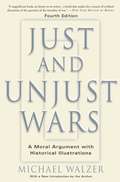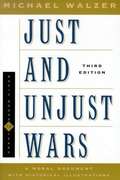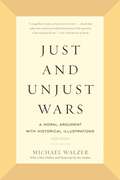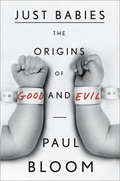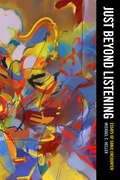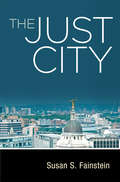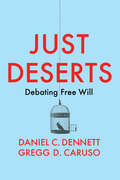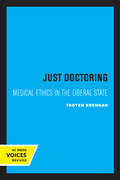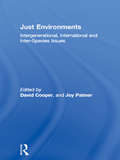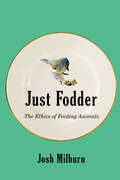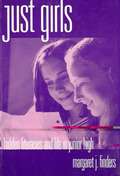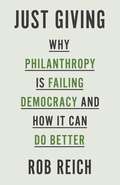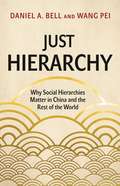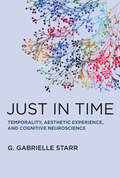- Table View
- List View
Jurgen Habermas: Critic in the Public Sphere (Critics of the Twentieth Century)
by Robert C. HolubThe most important intellectual in the Federal Republic of Germany for the past three decades, Habermas has been a seminal contributor to fields ranging from sociology and political science to philosophy and cultural studies. Although he has stood at the centre of concern in his native land, he has been less readily accepted outside Germany, particularly in the humanities. His theoretical work postulates the centrality of communication and understanding, and as such his strategy of debate is marked by a politically informed unity of theory and practice. Holub's book is the first detailed account of the major debates in which Habermas has engaged since the early sixties. It stems from the conviction that his critics have not understood the political strategy behind his various interventions, or the consistency that informs his intellectual activities. Habermas is viewed in dialogue with important philosophical, sociological and political currents in West Germany. Holub demonstrates how Habermas pursues a course that incorporates various aspects of his opponents' positions, while simultaneously defending perceived threats to democracy and open discussion.
Jürgen Habermas, Volumes I and II (International Library of Essays in the History of Social and Political Thought)
by Camil Ungureanu Klaus GüntherJürgen Habermas is widely regarded as one of the outstanding intellectuals of our time. This collection focuses on the theory of law which can be distilled from his vast compendium of work. At the same time the collection places this theory in the context of Habermas' overall contribution to the theory of society, political theory and social philosophy. Volume I on 'The Discourse Theory of Law and Democracy' identifies the theoretical foundations. Volume II focuses on the critical debate of Habermas' discourse theory of law and democracy, on the challenges posed by the postnational constellation (Europeanization and processes of globalization) and on particular strands within his work, such as genetic technology and religion. Each volume is prefaced by a comprehensive introduction by the editors.
The Juridical Act: A Study of the Theoretical Concept of an Act that aims to create new Legal Facts (Law and Philosophy Library #129)
by H. D. van der KaaijThis book puts forward a new theoretical concept of the juridical act, this concept is not described from the perspective of a specific national legal system, but instead represents the commonalities and ideas that stem from the Western legal tradition. Since the concept is system-independent, it does not rely on national or state laws.The book begins by detailing those characteristics that distinguish juridical acts from the general group of acts. It offers clear distinctions between the different aspects of juridical acts, such as the power and the competence needed in order to perform the act, the fact that juridical acts are constitutive speech acts, and the rules that connect the act with its consequences. In the process, the book dispels much of the haziness currently surrounding juridical acts.Developed with a mix of theory and practice, this new concept is better equipped to deal with modern trends and practices. Further, since the author has freed the idea of the juridical act from the bonds of history and geography, it is also more suited to facilitating a better understanding of and explaining changes in the legal landscape, such as the rise of computer technology. Accordingly, it offers scholars and practitioners alike a valuable new tool for explaining and theorizing about the law.
The Juridification of Business Ethics
by Bart JansenThis book provides a theory of the juridification of business ethics. Ethical codes pop up everywhere in the business world and increasingly resemble the code of law. A focus on compliance rather than reflection becomes the norm. Legal perspectives replace ethical perspectives, turning ethicists into lawyers without a law degree. This juridification of business ethics conceals a diminishing trust in ethics, as legal reasoning substitutes philosophical thinking. By appealing to the critical study of law, Bart Jansen advocates for a renewed focus on the ethical side of business. This book shows the importance of a good balance between law and ethics in business and is of great interest to both academics and professionals.
Jurisdiction in Deleuze: The Expression And Representation Of Law
by Edward MussawirJurisdiction in Deleuze: The Expression and Representation of Law explores an affinity between the philosophy of Gilles Deleuze and jurisprudence as a tradition of technical legal thought. The author addresses and reopens a central aesthetic problem in jurisprudence: the difference between the expression and the representation of law. Deleuze is taken as offering not just an important methodological recovery of an ‘expressionism’ in philosophy – specifically through Nietzsche and Spinoza – but also a surprisingly practical jurisprudence which recasts the major technical terms of jurisdiction (persons, things and actions) in terms of their distinctively expressive or performative modalities. In paying attention to law’s expression, Deleuze is thus shown to offer an account of how meaning may attach to the instrument and medium of law and how legal desire may be registered within the texture and technology of jurisdiction. Contributing both to a renewed transposition of Deleuze into contemporary legal theory, as well as to an emerging interest in law’s technology, institution and instrumentality in critical legal studies, Jurisdiction in Deleuze will be of considerable interest.
The Jurisprudence of Emergency
by Nasser HussainHussain analyses the uses and the history of a range of emergency powers, such as the suspension of habeas corpus and the use of military tribunals. His study focuses on British colonialism in India from the late eighteenth to the early twentieth century to demonstrate how questions of law and emergency shaped colonial rule, which in turn affected the place of colonialism in modern law, depicting the colonies not as passive recipients but as agents in the interpretation and delineation of Western ideas and practices. Nasser Hussain is Professor of History at Amherst College.
The Jurisprudence of Style: A Structuralist History Of American Pragmatism And Liberal Legal Thought (Cambridge Historical Studies In American Law And Society Series)
by Justin Desautels-SteinIn the contemporary domain of American legal thought there is a dominant way in which lawyers and judges craft their argumentative practice. More colloquially, this is a dominant conception of what it means to 'think like a lawyer'. Despite the widespread popularity of this conception, it is rarely described in detail or given a name. Justin Desautels-Stein tells the story of how and why this happened, and why it matters. Drawing upon and updating the work of Harvard Law School's first generation of critical legal studies, Desautels-Stein develops what he calls a jurisprudence of style. In doing so, he uncovers the intellectual alliance, first emerging at the end of the nineteenth century and maturing in the last third of the twentieth century, between American pragmatism and liberal legal thought. Applying the tools of legal structuralism and phenomenology to real-world cases in areas of contemporary legal debate, this book develops a practice-oriented understanding of legal thought.
Juristic Concept of the Validity of Statutory Law: A Critique of Contemporary Legal Nonpositivism
by Malgorzata Kieltyka Andrzej GrabowskiThis book presents the theory of the validity of legal norms, aimed at the practice of law, in particular the jurisdiction of the constitutional courts. The postpositivist concept of the validity of statutory law, grounded on a critical analysis of the basic theories of legal validity elaborated up to now, is introduced. In the first part of the book a contemporary German nonpositivist conception of law developed by Ralf Dreier and Robert Alexy is analysed in order to answer the question whether the juristic concept of legal validity should include moral standards or criteria. In the second part, a postpositivist concept of legal validity and an innovative model of validity discourse, based on the juristic presumption of the validity of legal norms, are proposed. The book is a work on analytical legal theory, written from a postpositivist, detached point of view.
Jus Post Bellum and Transitional Justice
by Larry May Elizabeth EdenbergThis collection of essays brings together jus post bellum and transitional justice theorists to explore the legal and moral questions that arise at the end of war and in the transition to less oppressive regimes. Transitional justice and jus post bellum share in common many concepts that will be explored in this volume. In both transitional justice and jus post bellum, retribution is crucial. In some contexts criminal trials will need to be held, and in others truth commissions and other hybrid trials will be considered more appropriate means for securing some form of retribution. But there is a difference between how jus post bellum is conceptualized, where the key is securing peace, and transitional justice, where the key is often greater democratization. This collection of essays highlights both the overlap and the differences between these emerging bodies of scholarship and incipient law.
Just American Wars: Ethical Dilemmas in U.S. Military History (War, Conflict and Ethics)
by Eric PattersonThis book examines the moral choices faced by U.S. political and military leaders in deciding when and how to employ force, from the American Revolution to the present day. Specifically, the book looks at discrete ethical dilemmas in various American conflicts from a just war perspective. For example, was the casus belli of the American Revolution just, and more specifically, was the Continental Congress a "legitimate" political authority? Was it just for Truman to drop the atomic bomb on Japan? How much of a role did the egos of Kennedy, Johnson and Nixon play in prolonging the Vietnam War? Often there are trade-offs that civilian and military leaders must take into account, such as General Scott’s 1847 decision to bombard the city of Veracruz in order to quickly move his troops off the malarial Mexican coast. The book also considers the moral significance and policy practicalities of different motives and courses of action. The case studies provided highlight the nuances and even limits of just war principles, such as just cause, right intention, legitimate authority, last resort, likelihood of success, discrimination, and proportionality, and principles for ending war such as order, justice, and conciliation. This book will be of interest for students of just war theory, ethics, philosophy, American history and military history more generally.
Just and Unjust Wars: A Moral Argument with Historical Illustrations, 4th Ed.
by Michael WalzerFrom the Athenian attack on Melos to the My Lai Massacre, from the wars in the Balkans through the first war in Iraq, Michael Walzer examines the moral issues surrounding military theory, war crimes, and the spoils of war. He studies a variety of conflicts over the course of history, as well as the testimony of those who have been most directly involved--participants, decision makers, and victims. In his introduction to this new edition, Walzer specifically addresses the moral issues surrounding the war in and occupation of Iraq, reminding us once again that "the argument about war and justice is still a political and moral necessity. "
Just and Unjust Wars: A Moral Argument With Historical Illustrations, 3rd Ed.
by Michael WalzerThis classic work examines the issues surrounding military theory, war crimes, and the spoils of war from the Athenian attack on Melos to the My Lai massacre. A revised and updated classic treatment of the morality of war written by one of our country's leading philosophers. Just and Unjust Wars examines a variety of conflicts in order to understand exactly why, according to Walzer, "the argument about war and justice is still a political and moral necessity." Walzer's classic work draws on historical illustrations that range all the way from the Athenian attack on Melos to this morning's headlines, and uses the testimony of participants-decision makers and victims alike-to examine the moral issues of warfare.
Just and Unjust Wars: A Moral Argument with Historical Illustrations
by Michael WalzerFrom the Athenian attack on Melos to the My Lai Massacre, from the wars in the Balkans through the first war in Iraq, Michael Walzer examines the moral issues surrounding military theory, war crimes, and the spoils of war. He studies a variety of conflicts over the course of history, as well as the testimony of those who have been most directly involved--participants, decision makers, and victims. In his introduction to this new edition, Walzer specifically addresses the moral issues surrounding the war in and occupation of Iraq, reminding us once again that "the argument about war and justice is still a political and moral necessity."
Just Babies: The Origins of Good and Evil
by Paul Bloom<P>A leading cognitive scientist argues that a deep sense of good and evil is bred in the bone. From John Locke to Sigmund Freud, philosophers and psychologists have long believed that we begin life as blank moral slates. Many of us take for granted that babies are born selfish and that it is the role of society--and especially parents--to transform them from little sociopaths into civilized beings. <P>In Just Babies, Paul Bloom argues that humans are in fact hardwired with a sense of morality. Drawing on groundbreaking research at Yale, Bloom demonstrates that, even before they can speak or walk, babies judge the goodness and badness of others' actions; feel empathy and compassion; act to soothe those in distress; and have a rudimentary sense of justice. <P>Still, this innate morality is limited, sometimes tragically. We are naturally hostile to strangers, prone to parochialism and bigotry. Bringing together insights from psychology, behavioral economics, evolutionary biology, and philosophy, Bloom explores how we have come to surpass these limitations. <P> Along the way, he examines the morality of chimpanzees, violent psychopaths, religious extremists, and Ivy League professors, and explores our often puzzling moral feelings about sex, politics, religion, and race. In his analysis of the morality of children and adults, Bloom rejects the fashionable view that our moral decisions are driven mainly by gut feelings and unconscious biases. <P>Just as reason has driven our great scientific discoveries, he argues, it is reason and deliberation that makes possible our moral discoveries, such as the wrongness of slavery. Ultimately, it is through our imagination, our compassion, and our uniquely human capacity for rational thought that we can transcend the primitive sense of morality we were born with, becoming more than just babies. <P>Paul Bloom has a gift for bringing abstract ideas to life, moving seamlessly from Darwin, Herodotus, and Adam Smith to The Princess Bride, Hannibal Lecter, and Louis C.K. Vivid, witty, and intellectually probing, Just Babies offers a radical new perspective on our moral lives. <P><b>A New York Times Bestseller</b>
Just Beyond Listening: Essays of Sonic Encounter (California Studies in Music, Sound, and Media #5)
by Michael C. HellerJust Beyond Listening asks how we might think about encounters with sound that complicate standard accounts of aurality. In a series of essays, Michael C. Heller considers how sound functions in dialogue with a range of sensory and affective modalities, including physical co-presence, textual interference, and spectral haunting. The text investigates sound that is experienced in other parts of the body, altered by cross-wirings of the senses, weaponized by the military, or mediated and changed by cultural practices and memory. Building on recent scholarship in sound studies and affect theory, Heller questions not only how sound propagates acoustically but how sonic presences temper our total experience of the world around us.
The Just City
by Susan S. FainsteinFor much of the twentieth century improvement in the situation of disadvantaged communities was a focus for urban planning and policy. Yet over the past three decades the ideological triumph of neoliberalism has caused the allocation of spatial, political, economic, and financial resources to favor economic growth at the expense of wider social benefits. Susan Fainstein's concept of the "just city" encourages planners and policymakers to embrace a different approach to urban development. Her objective is to combine progressive city planners' earlier focus on equity and material well-being with considerations of diversity and participation so as to foster a better quality of urban life within the context of a global capitalist political economy. Fainstein applies theoretical concepts about justice developed by contemporary philosophers to the concrete problems faced by urban planners and policymakers and argues that, despite structural obstacles, meaningful reform can be achieved at the local level.In the first half of The Just City, Fainstein draws on the work of John Rawls, Martha Nussbaum, Iris Marion Young, Nancy Fraser, and others to develop an approach to justice relevant to twenty-first-century cities, one that incorporates three central concepts: diversity, democracy, and equity. In the book's second half, Fainstein tests her ideas through case studies of New York, London, and Amsterdam by evaluating their postwar programs for housing and development in relation to the three norms. She concludes by identifying a set of specific criteria for urban planners and policymakers to consider when developing programs to assure greater justice in both the process of their formulation and their effects.
Just Deserts: Debating Free Will
by Daniel C. Dennett Gregg D. CarusoThe concept of free will is profoundly important to our self-understanding, our interpersonal relationships, and our moral and legal practices. If it turns out that no one is ever free and morally responsible, what would that mean for society, morality, meaning, and the law? Just Deserts brings together two philosophers – Daniel C. Dennett and Gregg D. Caruso – to debate their respective views on free will, moral responsibility, and legal punishment. In three extended conversations, Dennett and Caruso present their arguments for and against the existence of free will and debate their implications. Dennett argues that the kind of free will required for moral responsibility is compatible with determinism – for him, self-control is key; we are not responsible for becoming responsible, but are responsible for staying responsible, for keeping would-be puppeteers at bay. Caruso takes the opposite view, arguing that who we are and what we do is ultimately the result of factors beyond our control, and because of this we are never morally responsible for our actions in the sense that would make us truly deserving of blame and praise, punishment and reward. Just Deserts introduces the concepts central to the debate about free will and moral responsibility by way of an entertaining, rigorous, and sometimes heated philosophical dialogue between two leading thinkers.
Just Doctoring: Medical Ethics in the Liberal State
by Troyen A. BrennanThis title is part of UC Press's Voices Revived program, which commemorates University of California Press’s mission to seek out and cultivate the brightest minds and give them voice, reach, and impact. Drawing on a backlist dating to 1893, Voices Revived makes high-quality, peer-reviewed scholarship accessible once again using print-on-demand technology. This title was originally published in 1991.
Just Environments: Intergenerational, International and Inter-Species Issues
by David E. Cooper Joy A. PalmerCan we do what we want with other species? How do conflicting international interests affect global issues? What do we owe the next generation? Just Environments investigates these questions and the ethics which lie at their core.
Just Fodder: The Ethics of Feeding Animals
by Josh MilburnAnimal lovers who feed meat to other animals are faced with a paradox: perhaps fewer animals would be harmed if they stopped feeding the ones they love. Animal diets do not raise problems merely for individuals. To address environmental crises, health threats, and harm to animals, we must change our food systems and practices. And in these systems, animals, too, are eaters.Moving beyond what humans should eat and whether to count animals as food, Just Fodder answers ethical and political questions arising from thinking about animals as eaters. Josh Milburn begins with practical dilemmas about feeding the animals closest to us, our pets or animal companions. The questions grow more complicated as he considers relationships with more distance – questions about whether and how to feed garden birds, farmland animals who would eat our crops, and wild animals. Milburn evaluates the nature and circumstances of our relationships with animals to generate a novel theory of animal rights.Looking past arguments about what we can and cannot do to other beings, Just Fodder asks what we can, should, and must do for them, laying out a fuller range of our ethical obligations to other animals.
Just Girls: Hidden Literacies and Life in Junior High
by Margaret J. FindersHighlighting the social importance of friendship, family and social networks in girls' sense of themselves, she suggests that literacy plays an important role in maintaining friendship groups and in the construction of the self.
Just Giving: Why Philanthropy Is Failing Democracy and How It Can Do Better
by Rob ReichThe troubling ethics and politics of philanthropyIs philanthropy, by its very nature, a threat to today’s democracy? Though we may laud wealthy individuals who give away their money for society’s benefit, Just Giving shows how such generosity not only isn’t the unassailable good we think it to be but might also undermine democratic values and set back aspirations of justice. Big philanthropy is often an exercise of power, the conversion of private assets into public influence. And it is a form of power that is largely unaccountable, often perpetual, and lavishly tax-advantaged. The affluent—and their foundations—reap vast benefits even as they influence policy without accountability. And small philanthropy, or ordinary charitable giving, can be problematic as well. Charity, it turns out, does surprisingly little to provide for those in need and sometimes worsens inequality.These outcomes are shaped by the policies that define and structure philanthropy. When, how much, and to whom people give is influenced by laws governing everything from the creation of foundations and nonprofits to generous tax exemptions for donations of money and property. Rob Reich asks: What attitude and what policies should democracies have concerning individuals who give money away for public purposes? Philanthropy currently fails democracy in many ways, but Reich argues that it can be redeemed. Differentiating between individual philanthropy and private foundations, the aims of mass giving should be the decentralization of power in the production of public goods, such as the arts, education, and science. For foundations, the goal should be what Reich terms “discovery,” or long-time-horizon innovations that enhance democratic experimentalism. Philanthropy, when properly structured, can play a crucial role in supporting a strong liberal democracy.Just Giving investigates the ethical and political dimensions of philanthropy and considers how giving might better support democratic values and promote justice.
Just Hierarchy: Why Social Hierarchies Matter in China and the Rest of the World
by Daniel A. BellA trenchant defense of hierarchy in different spheres of our lives, from the personal to the politicalAll complex and large-scale societies are organized along certain hierarchies, but the concept of hierarchy has become almost taboo in the modern world. Just Hierarchy contends that this stigma is a mistake. In fact, as Daniel Bell and Wang Pei show, it is neither possible nor advisable to do away with social hierarchies. Drawing their arguments from Chinese thought and culture as well as other philosophies and traditions, Bell and Wang ask which forms of hierarchy are justified and how these can serve morally desirable goals. They look at ways of promoting just forms of hierarchy while minimizing the influence of unjust ones, such as those based on race, sex, or caste.Which hierarchical relations are morally justified and why? Bell and Wang argue that it depends on the nature of the social relation and context. Different hierarchical principles ought to govern different kinds of social relations: what justifies hierarchy among intimates is different from what justifies hierarchy among citizens, countries, humans and animals, and humans and intelligent machines. Morally justified hierarchies can and should govern different spheres of our social lives, though these will be very different from the unjust hierarchies that have governed us in the past.A vigorous, systematic defense of hierarchy in the modern world, Just Hierarchy examines how hierarchical social relations can have a useful purpose, not only in personal domains but also in larger political realms.
Just Hierarchy: Why Social Hierarchies Matter in China and the Rest of the World
by Daniel Bell Wang PeiA trenchant defense of hierarchy in different spheres of our lives, from the personal to the politicalAll complex and large-scale societies are organized along certain hierarchies, but the concept of hierarchy has become almost taboo in the modern world. Just Hierarchy contends that this stigma is a mistake. In fact, as Daniel Bell and Wang Pei show, it is neither possible nor advisable to do away with social hierarchies. Drawing their arguments from Chinese thought and culture as well as other philosophies and traditions, Bell and Wang ask which forms of hierarchy are justified and how these can serve morally desirable goals. They look at ways of promoting just forms of hierarchy while minimizing the influence of unjust ones, such as those based on race, sex, or caste.Which hierarchical relations are morally justified and why? Bell and Wang argue that it depends on the nature of the social relation and context. Different hierarchical principles ought to govern different kinds of social relations: what justifies hierarchy among intimates is different from what justifies hierarchy among citizens, countries, humans and animals, and humans and intelligent machines. Morally justified hierarchies can and should govern different spheres of our social lives, though these will be very different from the unjust hierarchies that have governed us in the past.A vigorous, systematic defense of hierarchy in the modern world, Just Hierarchy examines how hierarchical social relations can have a useful purpose, not only in personal domains but also in larger political realms.
Just in Time: Temporality, Aesthetic Experience, and Cognitive Neuroscience
by G. Gabrielle StarrLiterature and neuroscience come together to illuminate the human experience of beauty, which unfolds in time.How does beauty exist in time? This is Gabrielle Starr&’s central concern in Just in Time as she explores the experience of beauty not as an abstraction, but as the result of psychological and neurological processes in which time is central. Starr shows that aesthetic experience has temporal scale. Starr, a literary scholar and pioneer in the field and method of neuroaesthetics, which seeks the neurological basis of aesthetic experience, applies this methodology to the study of beauty in literature, considering such authors as Rita Dove, Gerard Manley Hopkins, Henry James, Toni Morrison, and Wallace Stevens, as well as the artists Dawoud Bey and Jasper Johns.Just in Time is richly informed by the methods and findings of neuroscientists, whose instruments let them investigate encounters with art down to the millisecond, but Starr goes beyond the laboratory to explore engagements with art that unfold over durations experiments cannot accommodate. In neuroaesthetics, Starr shows us, the techniques of the empirical sciences and humanistic interpretation support and complement one another. To understand the temporal quality of aesthetic experience we need both cognitive and phenomenological approaches, and this book moves boldly toward their synthesis.
